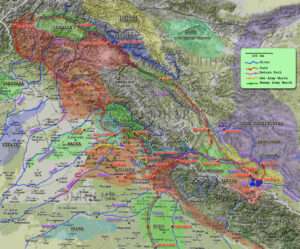
The preparations began.
First of all, it was necessary to find a Brahmana sufficiently qualified to lead the complicated ritual, and on this everyone immediately agreed: no one like the great Vyasa would have been able to do it with the right skill.
The second step would be to get all the Kings to accept Yudhisthira as emperor and collect the traditional taxes. This feat required great combat prowess, so after calling his brothers, Pandu’s first son said:
“Go to all the lands of the world, and demand tribute and submission from the monarchs of the various kingdoms. Only if someone refuses, you would face him and subjugate him by force. But don’t try to create enemies, rather make friends and alliances.”
Yudhisthira entrusted the conquest of the north to Arjuna, the east to Bhima, the west to Nakula, and the south to Sahadeva.
Escorted by a mighty army of veteran and fearless warriors, Arjuna proceeded in the direction of the Himalayan peaks, and reduced the rulers of the lands visited to obedience, using diplomacy or military strength as appropriate.
Arriving at Prajyotisha, he wanted to meet the great Bhagadatta, of whom fabulous things were said about his righteousness and his valor in battle; the Pandava himself could see how those rumors were not unfounded: refusing to pay tribute without first being defeated in a duel, Bhagadatta engaged Arjuna in a fierce fight. Having emerged victorious, the latter bestowed great tributes on the elderly and noble warrior.
Continuing his march, he crossed and conquered many other kingdoms, also stopping to visit beautiful holy places and marvelous hermitages in the forests most deserted by man. Among others, he subdued the Trigarta brothers, who had always been great friends of Duryodhana and sworn enemies of the Pandavas.
Arriving at the Meru mountain, he delighted in the sight of the beauties of the Himalayan’s high altitudes.
Finally, he returned to Indra-prastha, taking with him incalculable riches.
At the same time, Bhima, in command of his troops, proceeded eastward, reporting no less triumphs than his younger brother. Obviously, without having been forced to face them in combat, he obtained the assent and tribute of the king of Panchala, from his father-in-law, Drupada, and from the king of Mithila.
Arriving in Chedi, Sishupala received him with full honors and accepted Yudhisthira as emperor. Passing through Koshala, Ayodhya and many other kingdoms, he obtained great triumphs in the battles. He too returned bringing with him immense wealth.
Nakula raged in the west, forming solid friendships and winning resounding victories over the monarchs who did not want to submit to the dominion of the Pandavas.
Sahadeva was no less. He clashed with the hostile Dantavakra, defeated him and claimed enormous tributes, as happened with many other monarchs, including Nila, who among other things was protected by the Deva Agni. Among those who did not oppose him were his cousin Ghatotkacha and Vibhishana, the elderly king of Lanka, with whom he befriended. Surrounded by a halo of glory, the brave Sahadeva, the last of the brothers, returned to Indra-prastha.
As soon as the Pandavas had returned to the capital, thanks to all that wealth, preparations began with fervor. And as had happened for the inauguration of the Sabha, the invitations for the sacrifice were sent with the utmost promptness. Nakula personally went to invite Krishna, who left a few days later.
For the second time in a short time Indra-prastha was a riot of people, all eager to witness the magnificent sacrifice. Using great care not to cause conflict, invitations were also sent to the cousins. Duryodhana himself helped in carrying out the sacrifice and taking care of the treasury; this task made him personally ascertain the incalculable wealth that circulated in the coffers of the hated relatives, a heritage that he and his brothers would never have dreamed of owning. But he made no comment, and kept it all inside.
The Rajasuya was a great success. All the sages present continually blessed the virtuous Yudhisthira and his brothers, claiming that never had such a beautiful and opulent yajna been seen. Only Narada was silent; his prophetic eye saw in time the terrifying events that would happen.
This is a section of the book “Maha-bharata, Vol. 1”.
To buy the complete book, click above
Post view 171 times


